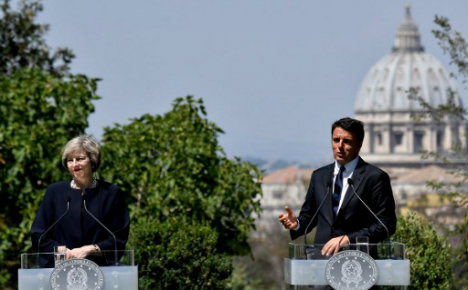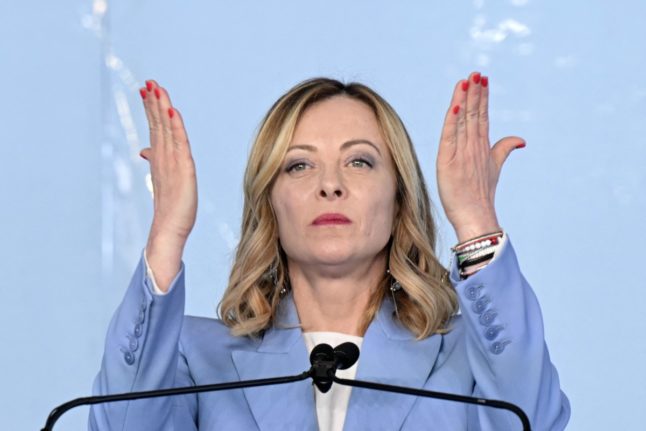After a long lunch, the two premiers addressed the press in the grounds of Rome’s plush Vila Panphilij, overlooking the iconic dome of St. Peter’s Basilica.
Here’s what we learned.
Brexit
Unsurprisingly, the UK's recent decision to leave the EU dominated the short diplomatic meeting.
And with good reason.
There are some 600,000 Italian citizens currently living and working in the UK, while Italy represents the UK’s 8th biggest export market, buying €24 billion worth of UK goods and services each year.
“Brexit was a sad moment, but we respect the will of the British people,” Renzi said, adding that Britain's exit from the 28-country bloc should begin as soon as possible.
“We can’t go back on the referendum, without damaging democracy and our credibility,” he told reporters. “We now need to develop a precise timeline [for the Brexit].”
May promised that she ‘wanted, expected and intended’ to be able to guarantee the future rights of Italian citizens now living in the UK, but said it would not be possible “if the rights of British citizens living in the rest of Europe were not also guaranteed.”
“Leaving the EU doesn’t change the strength of the connection between the UK and Italy in terms of their culture, politics and humanitarian efforts,” Renzi added.
Terrorism
The pair condemned Tuesday's terrorist attack in northern France, and expressed their concern over recent attacks in France and Germany.
Italy and the UK will continue to work together to reduce the terror threat to Europe by securing a peace agreement in Syria and increasing efforts to bring political stability to Iraq and Libya.
“We need to prevent Libya from becoming a base for Daesh,” said May, referring to Isis by its alternative name.
Both Italy and the UK have been working hard to stabilize the country, which descended into civil war following the 2011 overthrow of the country’s authoritarian leader Muammar Gadaffi.
Migration
Italy has welcomed over 220,000 refugees and asylum seekers since the beginning of 2015.
Earlier this year, former UK Prime Minister David Cameron stated the UK would help share the burden of front line EU countries by accepting 20,000 Syrian refugees by the end of 2020.
At the time, many criticized that figure as unsatisfactory, but May gave no signs she would be open to taking any more refugees from Italy.
“90 percent of The EU's migrants are crossing from Libya,” she said, announcing Italy and the UK would be working to bolster the capacity of the Libyan coastguard to ensure the number of illegal crossings falls.
She also endorsed Matteo Renzi’s ‘Migration Compact’ – a political programme that will see countries in sub-saharan Africa given extra aid if they do more to stem the flow of people leaving the country.
The menu
The pair enjoyed an austere but highly Italian lunch of penne with tomato sauce, steak and home-made oven chips, which was followed by strawberry and lemon ice cream.
Renzi's office gave no indication as to whether any wine had accompanied the meal.
May’s Italian stop comes as part of a whirlwind diplomatic tour of EU member states, which will see her visit Slovakia on Thursday and Poland on Friday.



 Please whitelist us to continue reading.
Please whitelist us to continue reading.
Member comments